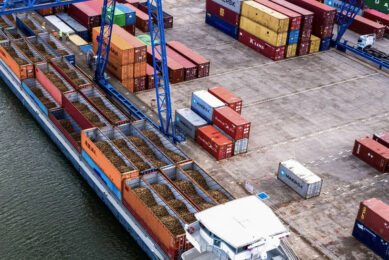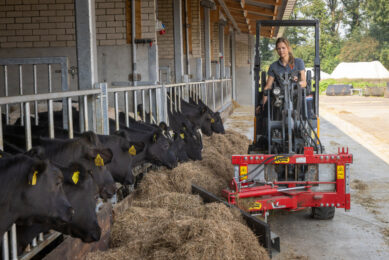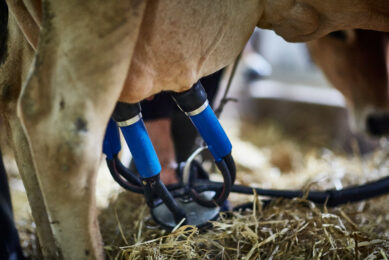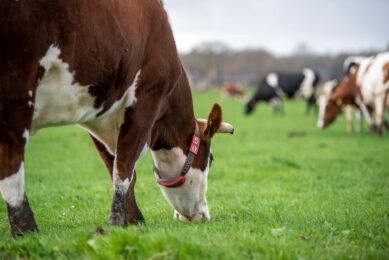Dairy-Tech 2023: Awards for milk yield, fat and protein production
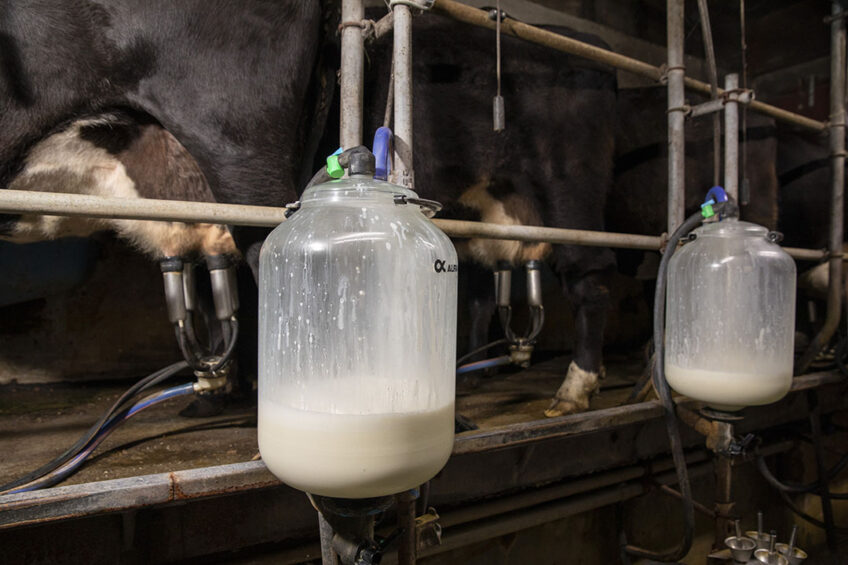
The UK’s top dairy award, The Gold Cup, has gone to a pedigree Holstein fifth-generation partnership – the Logan family – who run the 280-head Holehouse herd in Ayrshire, Scotland.
The mainly red and white cows averaged 10,500 kg of milk at 4.10% butterfat and 3.40% protein on twice a day milking for the qualifying year to September 2021. Milk from the all-year-round calving herd is sold to Muller.
Royal Association of British Dairy Farmers (RABDF) chair and one of the judges, Di Wastenage, said Logan’s enterprise “had it all” when it comes to a farming system: “They tick all the boxes for sustainability, the environment, maximising output from the land and optimising herd health and welfare. They’re at the forefront of many technological advances to help drive forward their 280-cow pedigree Holstein herd.”
Dairy-Tech 2023 awards
In addition to the presentation of the National Milk Records RABDF Gold Cup, 4 further awards were made at Dairy-Tech 2023: The Chris May Memorial Cup Award for the Gold cup qualifying herd with the highest lifetime daily yield was awarded to the Torrance family from Stapleford Abbotts, near Romford, Essex. Their Curtismill pedigree Holstein herd comprising 670 cows and 430 followers, achieved an average lifetime daily yield of 22.30 kg of milk per cow per day. The dairy business, run by John Torrance in partnership with father Robert, mother Janet and wife Lucy, was the winner of the Gold Cup in 2020.
The NMR Silver Salver, awarded to the qualifying Holstein herd with the highest combined fat and protein production, was presented to Messrs Harvey, Drum Farm, Beeswing, Dumfries. The farming family manage a herd of 300 pedigree Holstein cows. Their Killywhan herd achieved a combined fat and protein yield of 1.017 kg per cow and 14,267 kg of milk on 3-times-a-day milking.
Robert, Lorraine and Mark Hunterm from West Tarbrax Farm, Lanarkshire, are the 2022 winners of the Lillyhill Cup, awarded to the Gold Cup qualifying Jersey herd with the highest combined fat and protein. The Hunter’s Clydevalley Jerseys of 160 milking cows achieved a combined weight of 878.42 kg/cow. Cows yield 8,063 kg of milk at 6.97% fat and 3.93% protein.
And the Chairman’s Cup, for the herd other than Holstein and Jersey breeds, with the highest combined weight of fat and protein was won by Richard Bell from Wigton, Cumbria. His Nerewater pedigree Friesian herd of 70 milking cows had a winning combined fat and protein of 738 kg. The all-year round calving herd, run on a grass-based system, averages 8,800 kg of milk at 4.4% butterfat and 3.52% protein.
Milk assurance scheme
The event, which took place at Stoneleigh Park, saw the launch of a new milk assurance scheme. The Assured Integrated Milk Supplier (AIMS) scheme will ensure traceability in the GB supply chain for those purchasing milk from non-direct sources.
The new scheme covers milk which is supplied between dairy companies as part of commercial agreements and the AIMS Assured Standards fills an existing gap in current assurance and industry schemes. Developed by the industry and supported by Dairy UK, the scheme has created a Code of Practice that participating businesses comply with and are audited against. This ensures the traceability and provenance of milk for members and helps to guarantee suppliers have complied with their responsibilities.
AIMS chair, Tim Hampton, said: “Trading milk between dairies has many benefits, not only commercial but operational and environmental, which is needed for an efficient modern dairy industry. However, it has long been recognised it does create a gap in supply chain assurance. This scheme is designed to close that gap by developing a network of assured suppliers that can freely grade with confidence and help meet our customers and ultimately the consumers’ needs.”
It will sit alongside existing assurance schemes such as Red Tractor and the Dairy Transport Assurance Scheme. It is open to any dairy business buying and trading milk with other businesses in Great Britain.
Matthew Knight, RABDF managing director, said business was brisk at the show. However, producers were conscious of milk price cuts despite high input costs remaining, ongoing labour issues and increasing pressure to reduce emissions.
“The new lameness village attracted many visitors with foot trimming demonstrations taking place throughout the day. We’ll definitely look to build on it next year as more focus is placed on this important issue.”
Join 13,000+ subscribers
Subscribe to our newsletter to stay updated about all the need-to-know content in the dairy sector, two times a week.



